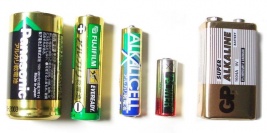Difference between revisions of "Alkaline battery"
(Leakage) |
(capacity) |
||
| Line 3: | Line 3: | ||
==Voltage== | ==Voltage== | ||
Initially upto 1.6v per cell. Voltage drop is approx linear over the battery's life, so life can be estimated by measuring off load voltage. | Initially upto 1.6v per cell. Voltage drop is approx linear over the battery's life, so life can be estimated by measuring off load voltage. | ||
| + | |||
| + | ==Capacity== | ||
| + | 'I once compared Energizer and Duracell and other brands of AA alkaline. I found they were all within 1% of the same capacity when discharged at about 40mA' ([http://groups.google.com/group/sci.electronics.design/browse_frm/thread/71486865bbc4ea20# ref]) | ||
==High power use== | ==High power use== | ||
Revision as of 18:34, 18 November 2011
Voltage
Initially upto 1.6v per cell. Voltage drop is approx linear over the battery's life, so life can be estimated by measuring off load voltage.
Capacity
'I once compared Energizer and Duracell and other brands of AA alkaline. I found they were all within 1% of the same capacity when discharged at about 40mA' (ref)
High power use
Alkalines feature much greater capacity than the zinc carbon battery. However delivered capacity depends greatly on load current with alkalines, and high drain apps dramatically reduce the capacity they can deliver, reducing battery life. Alkalines do perform to their full potential with low and medium drain use.
This effect makes the use of battery adaptors, which allow a smaller battery than intended to be used, a false economy.
For high drain applications, Nicad & NiMH deliver as much or greater capacity with a fraction of the run cost.
Ultra batteries
'ultra' 'extra' 'plus' etc alkaline batts are sold for high power use. These have capacity affected less by high drain to some extent, so last somewhat longer. However the cost is even higher.
Low power use
Alkalines are ideal for low & medium drain apps, where they can give much longer service life than ZnC, and avoid risk of leakage.
Leakage
Alkalines leak much less often than zinc carbon, so don't cause as much damage to appliances. Bu they do still leak, and batteries should be removed if the appliance isn't going to be used for a while.
Deposits leaked can be cleaned up with a mild acid, such as vinegar or soda water. Mild acids are themselves corrosive to metal, so should be washed off once done.
Shelf life
Shelf life is longer than ZnC.
